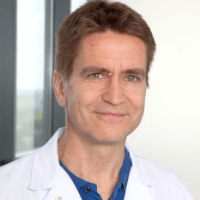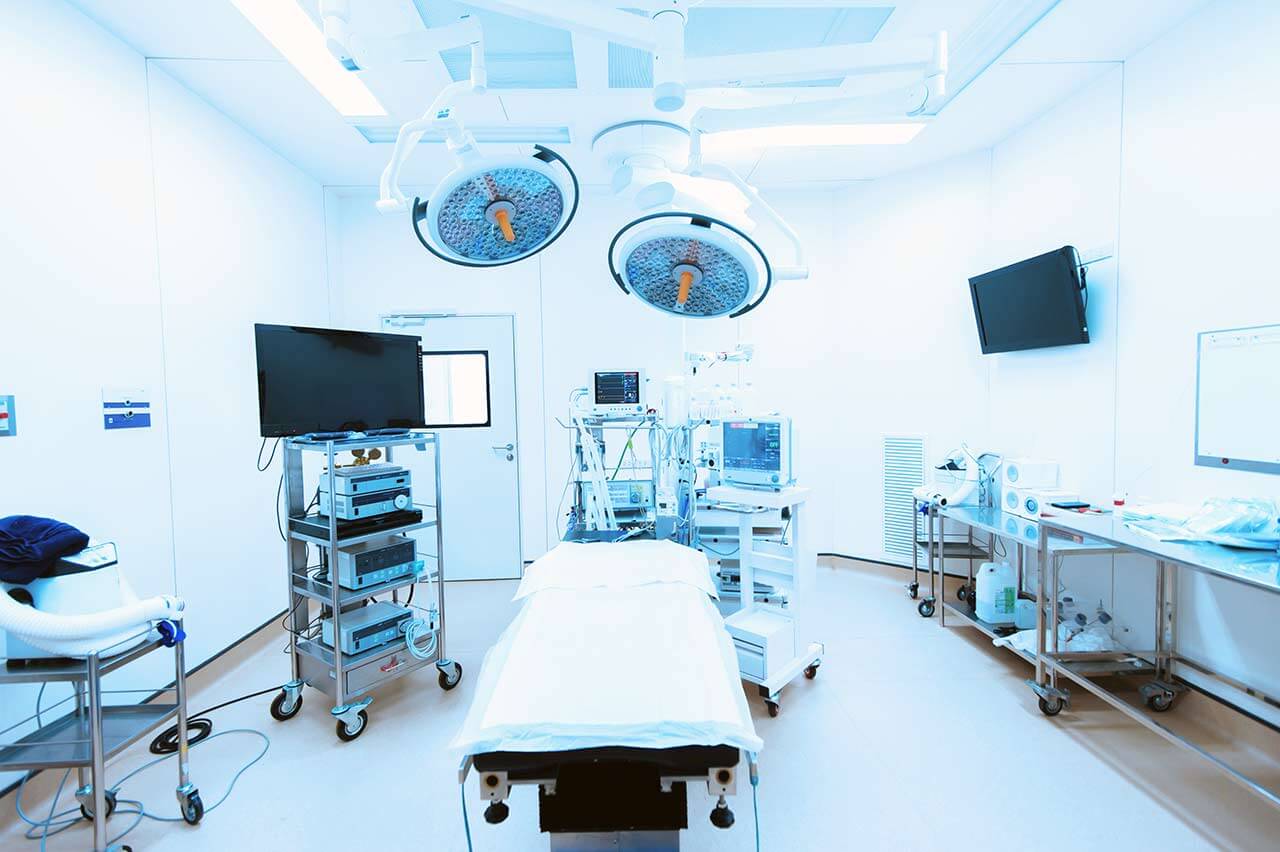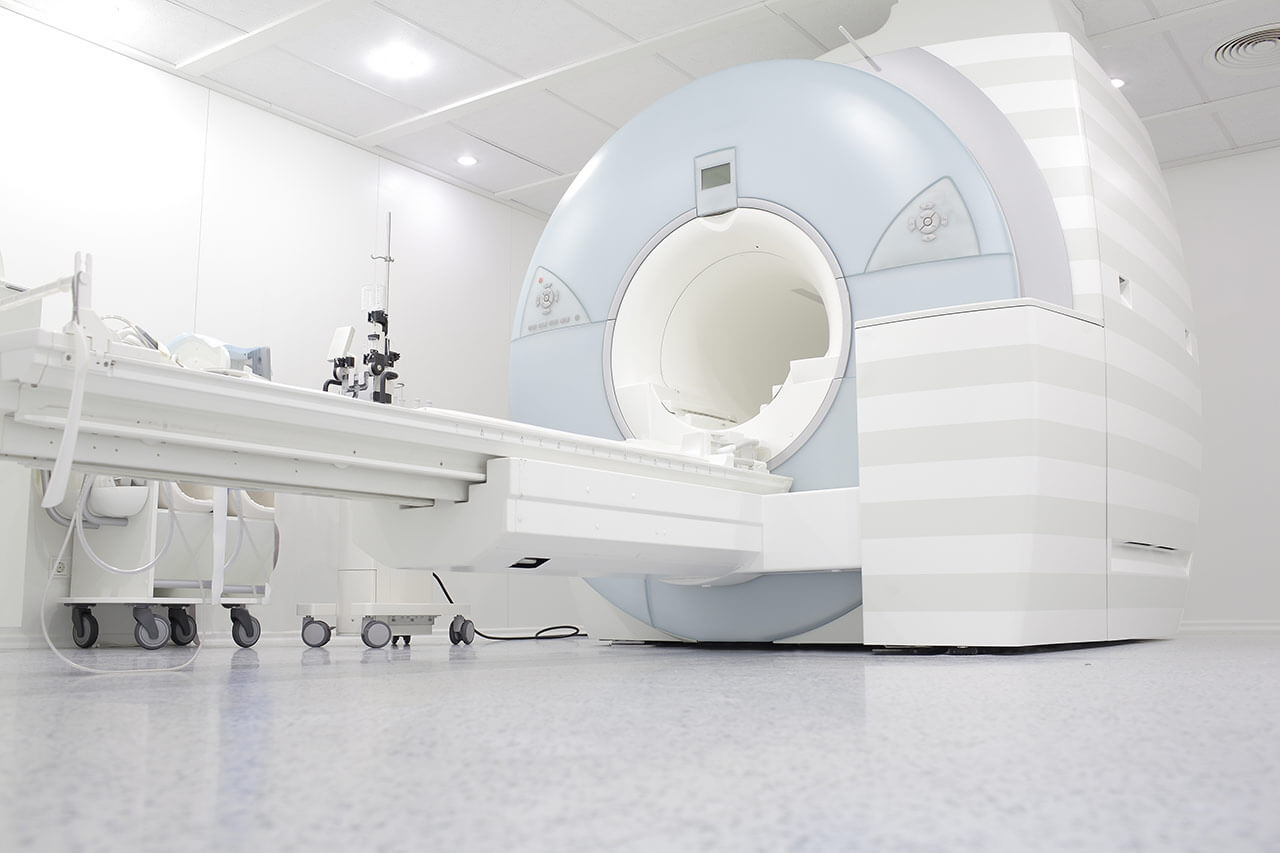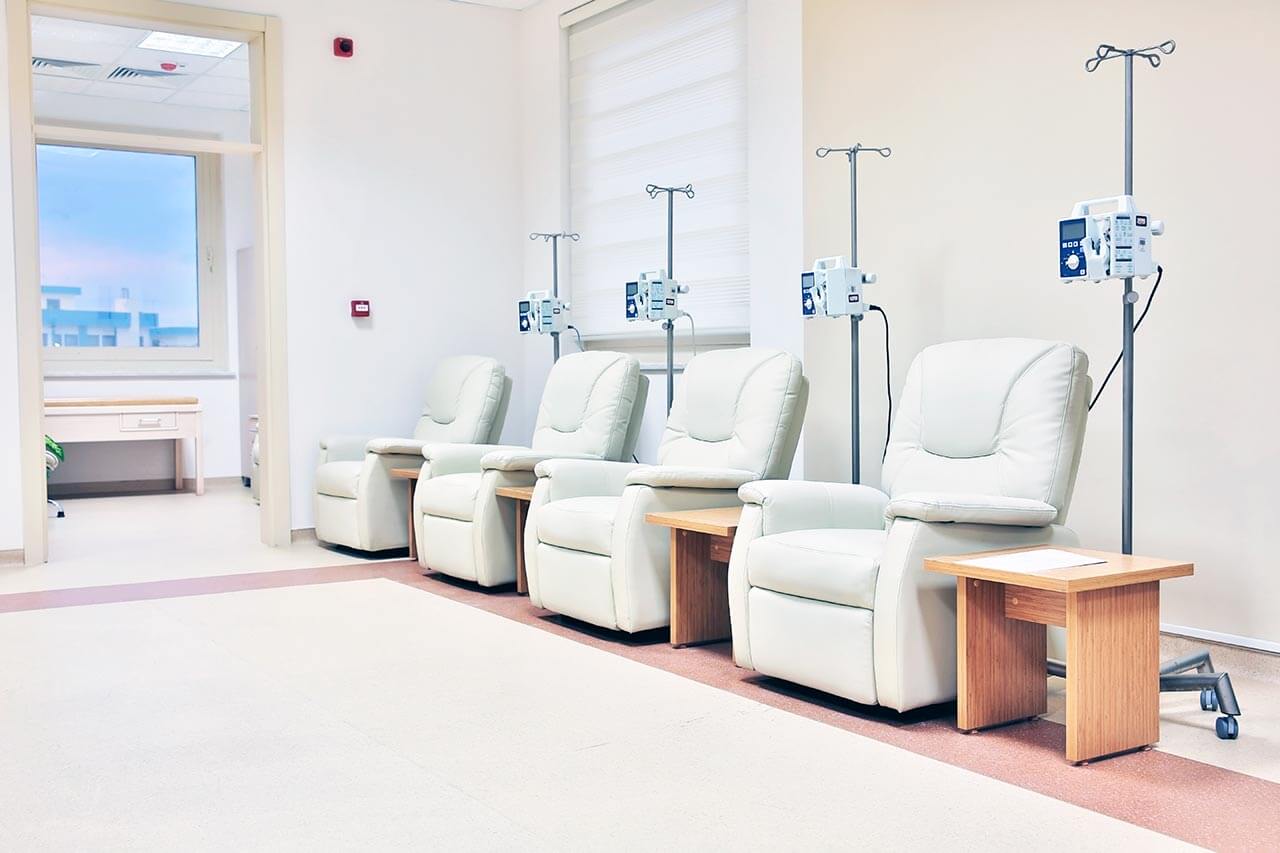
The program includes:
- Initial presentation in the clinic
- clinical history taking
- review of medical records
- physical examination
- laboratory tests:
- complete blood count
- general urine analysis
- biochemical analysis of blood
- inflammation indicators (CRP, ESR)
- indicators blood coagulation
- neurological examination
- functionality x-ray
- neuropsychological tests (on indications):
- ENMG (electroneuromyography)
- SEPs (somatosensory evoked potentials)
- CT/MRI of the spine
- myelography
- preoperative care
- decompressive laminectomy (2-3 segments)
- postoperative control
- symptomatic treatment
- control examinations
- the cost of essential medicines and materials
- nursing services
- full hospital accommodation
- developing of further guidance
Service
You may also book:
 BookingHealth Price from:
BookingHealth Price from:
About the department
The Department of Adult and Pediatric Orthopedics,Traumatology and Spine Surgery at the Hospital Nordwest Frankfurt am Main provides the full range of conservative and surgical treatment of musculoskeletal diseases and injuries. The department is certified by the German Trauma Society as a regional Trauma Center in the state of Hesse, and therefore medical care for patients with severe injuries meets the highest European standards. The medical facility deals with the treatment of injuries both in adults and children. The department's team of orthopedists is proud of its rich clinical experience and outstanding success in the treatment of diseases of the hand, foot, spine (in collaboration with neurosurgeons), knee, hip and shoulder joints. The first-line treatment is always drug therapy, and only if it is ineffective, the department's specialists resort to surgery. The department's operating rooms are equipped with state-of-the-art technology, so arthroscopic and minimally invasive interventions are the standard of surgical treatment here, while classic open operations are rarely performed. The Chief Physician of the department is Dr. med. Sven Rogmans.
In the field of traumatology, key attention is paid to the treatment of severe injuries, polytrauma, sports injuries and bone fractures in children. The department's specialists most often use modern plaster casts for bone fractures, while severe injuries and polytrauma usually require more serious treatment – an arthroscopic or minimally invasive intervention. The patients with injuries are admitted around the clock. When admitted to the department, the patient undergoes X-ray scanning and other diagnostic tests, according to the results of which the doctors decide on the most effective treatment method. In addition to the basic treatment, the patient receives recommendations on the prevention of post-traumatic complications and a course of postoperative rehabilitation (therapeutic exercises, physiotherapy, etc.). The department's traumatologists provide medical care in accordance with the current clinical protocols and recommendations of the German Trauma Society, due to which high treatment success rates are achieved.
One of the main focuses of the department's orthopedists is the treatment of knee, hip and shoulder arthrosis. At the initial stages, conservative treatment is possible, but most patients come to the department with advanced stages of arthrosis, in which the only effective treatment is joint replacement surgery (endoprosthetics). The department's doctors specialize in both partial and total joint replacement surgery. In addition, the department's medical team is distinguished by its competence in revision surgery to replace previously implanted endoprostheses when they are displaced, damaged, etc. The department uses only high-quality implants to replace a worn out joint, for example, implants made of titanium alloy. The titanium endoprostheses have a long service life and do not cause a rejection reaction, since titanium is a biocompatible material. The endoprosthesis is implanted using navigation systems, which allow the doctors to fix the artificial joint as accurately as possible, so after the operation the patient does not experience any discomfort and can restore mobility as much as possible. Joint replacement surgery is performed using minimally invasive techniques, which involve only one or several skin incisions, so postoperative recovery takes place in the shortest possible time.
An integral part of the department's clinical practice is also the treatment of spinal diseases and injuries. The specialists of the medical facility have in their arsenal both conservative and surgical treatments. The department has special competence in the treatment of spinal fractures, traumatic injuries of intervertebral discs, herniated discs, spinal stenosis, spinal instability, osteoporosis and other diseases. Whenever possible, spinal interventions are performed using minimally invasive surgical techniques, which greatly facilitate and speed up the postoperative recovery process. When performing interventions, the surgeons actively use innovative surgical microscopes, intraoperative 3D imaging and computer navigation, thereby eliminating damage to functionally important anatomical structures of the spine. Thus, the surgical treatment of spinal diseases and injuries in the department is not only highly effective, but also safe for the patient.
The department's service range is complemented by the treatment of diseases, injuries, congenital defects and acquired pathologies of the hand and foot. The department's doctors deal with the treatment of injuries of both hand and foot bones, ligaments and tendons, the treatment of Dupuytren's contracture, trigger fingers, ganglion, hallux valgus and hallux rigidus, heel spurs, Morton's neuroma and many other pathologies. First of all, the specialists use conservative treatment methods, while surgical intervention is the last-line therapy.
The department's main clinical focuses include:
- Diagnostics and treatment of injuries of any severity, including polytrauma and sports injuries in adults and children
- Diagnostics and treatment of spinal diseases
- Spinal fractures
- Traumatic injuries of the intervertebral discs
- Spinal disc herniation
- Spinal stenosis
- Spinal instability
- Radicular syndrome
- Osteoporosis
- Diagnostics and treatment of hand diseases
- Hand fractures
- Hand tendon and ligament injuries
- Wrist arthritis
- Dupuytren's contracture
- Trigger fingers
- Ganglion
- Diagnostics and treatment of foot diseases
- Foot fractures
- Foot tendon and ligament injuries
- Ankle arthrosis
- Hallux valgus
- Hallux rigidus
- Hammer and claw fingers
- Heel spur
- Morton's neuroma
- Diagnostics and treatment of hip diseases
- Congenital malformations
- Ankle arthrosis
- Diagnostics and treatment of knee diseases
- Knee bursitis
- Knee tendon and ligament injuries
- Injuries and pathological lesions of the menisci, knee cartilage, cruciate ligaments, synovial membrane, etc.
- Knee arthrosis
- Diagnostics and treatment of shoulder diseases
- Clavicle, humeral head and scapular fractures
- Rotator cuff tear
- Traumatic injuries of the shoulder ligaments
- Shoulder dislocations and shoulder instability
- Shoulder arthrosis
- Diagnostics and treatment of elbow diseases
- Diagnostics and treatment of other musculoskeletal diseases and injuries
The department's therapeutic options include:
- Conservative treatment methods (for example, plaster casts for bone fractures)
- Arthroscopic surgery
- Minimally invasive surgery
- Endoscopic interventions on the intervertebral discs
- Laser surgery
- Radiofrequency ablation
- Planning of surgical interventions using modern computer-assisted systems
- Other medical services
Curriculum vitae
Since 2019, Dr. med. Sven Rogmans has been heading the Department of Adult and Pediatric Orthopedics, Traumatology and Spinal Surgery at the Hospital Nordwest Frankfurt am Main. Prior to appointment as the Chief Physician, the specialist worked for 11 years as a Senior Physician with management responsibilities in the same department.
After studying Human Medicine at the University of Heidelberg, Dr. Sven Rogmans had his specialized training in the field of Surgery and Traumatology in the Department of Surgery at the Hospital Nordwest Frankfurt am Main. Until 2007, the specialist worked in hospitals in the cities of Darmstadt and Hanau. In 2008, the doctor had his board certification in Orthopedics and Traumatology.
Dr. Sven Rogmans' special clinical interests include conservative and surgical treatment of osteoarthritis, primary and revision arthroplasty, correction of foot deformities and treatment of sports injuries.
Photo of the doctor: (c) Krankenhaus Nordwest
About hospital
According to the reputable Focus magazine, the Hospital Nordwest Frankfurt am Main ranks among the top German medical facilities!
The hospital has a reputation of a modern multidisciplinary medical center with excellent quality of services. The medical complex is an academic hospital of the Goethe University Frankfurt, thanks to which it provides patients with treatment based on the very latest achievements of university medicine. The hospital has 12 specialized departments, as well as numerous narrowly focussed centers and institutes, whose doctors work hand in hand for the benefit of their patients. The hospital has 582 beds. The medical staff of the hospital annually provides diagnostics and treatment to more than 21,800 inpatients, while over 36,000 patients receive medical care on an outpatient basis.
The hospital presents such medical fields as oncology and hematology, radiation oncology, gynecology, urology, neurology, internal medicine, general and abdominal surgery, thoracic surgery, vascular surgery and others. Each of these medical fields is represented by a professional team of doctors and nursing staff. Oncology is one of the priority focuses of the hospital. In 2008, the Johann Wolfgang Goethe University Hospital Frankfurt together with the Hospital Nordwest Frankfurt am Main founded the University Cancer Center Frankfurt recognized by the German Cancer Aid as one of the best in Germany. In this high-tech center, the patients receive effective interdisciplinary medical care, since not only oncologists, chemotherapists and radiation oncologists are involved in the therapeutic process, but also specialists from related disciplines, including gynecologists, urologists, gastroenterologists, pulmonologists, surgeons and other experts. The patients are also provided with qualified psychological care, which is an integral part of the successful cancer treatment. Thanks to its status as an academic hospital, the medical facility gives patients the opportunity to participate in clinical trials at both national and international levels.
The hospital is proud of its health facilities and state-of-the-art equipment, which plays an important role in the effective diagnostics and treatment. For example, since 2016, the Department of Radiation Oncology has been using cutting-edge Truebeam STx NOVALIS linear accelerators from VARIAN and Brainlab, which allow the doctors to provide highly effective, but very sparing, radiation therapy for cancer treatment. Despite the presence of modern medical technologies in the hospital, the focus of the doctors is on the patient with his individual needs and wishes. The specialists pay attention to creating a friendly atmosphere in the hospital and always demonstrate humanity in relation to their patients.
The outstanding clinical activities of the medical complex are awarded by many prestigious certificates, including certificates of the German Cancer Society in the treatment of bowel, liver, prostate, gynecologic cancers, etc. The Aktion Saubere Hände certificate and a modern quality management system guarantee patients the highest safety standards during both diagnostic and therapeutic procedures.
Photo: (с) depositphotos
Accommodation in hospital
Patients rooms
The patients of the Hospital Nordwest Frankfurt am Main live in comfortable single and double rooms, corresponding to the level of a top-class hotel. Some single rooms have large panoramic windows offering beautiful views of the city of Frankfurt.
The patient room furnishing includes an automatically adjustable bed, a bedside table, a wardrobe with a built-in safe, a desk with a chair and a reading lamp, a TV, a telephone and a mini-fridge. The patient rooms have Wi-Fi (at an extra fee). All patient rooms have an ensuite bathroom with shower and toilet. In the bathroom one can find changeable towels, a bathrobe, a hairdryer and toiletries.
The hospital has a cafe on its territory, where one can not only have a tasty snack, but also buy newspapers, magazines, personal hygiene products, drinks, sweets and much more.
Meals and Menus
The patients of the hospital are offered delicious and varied three meals a day: breakfast, lunch and dinner. Meals are served to patients in their room. During the day, the patients are provided with fresh fruits, juices, coffee, tea and mineral water.
If you are on a specific diet for some reason, you will be offered an individual menu. Please inform the medical staff about your dietary preferences prior to the treatment.
Further details
Standard rooms include:
Religion
The religious services are available upon request.
Accompanying person
During the inpatient program, the accompanying person can live with the patient in a patient room or a hotel of his choice. Our managers will help you choose the most suitable option.
Hotel
During the outpatient program, the patient can stay at the hotel of his choice. Our managers will help you choose the most suitable option.





